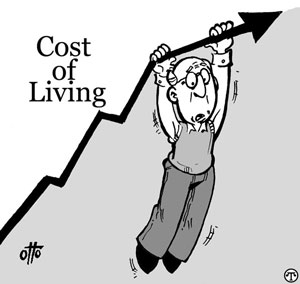Regional Areas Hard Hit By Rising Utilities Prices
Written by: on
 Ned K.
Ned K.
Australia has developed unevenly as a capitalist economy dominated by foreign owned corporations and finance capital.
In the 21st Century, the large eastern seaboard cities of Sydney, Melbourne and Brisbane have grown and absorbed or attracted most of the population growth of the country. This has reached the point where the urban sprawl of Sydney and Melbourne in particular is seeing the introduction of schemes which encourage new migrants to move to regional areas.
However, the regional areas are no 'land of promise" for new migrants or their longer-standing populations. Unemployment levels and underemployment levels in cities and towns west of the Blue Mountains and Great Divide Ranges are higher than the big cities on the eastern seaboard. Adelaide, although a capital city, is Included in "regional areas". It has never recovered from imperialism's de-industrialization of its northern and southern suburbs over a period from the 1980s to the recent closure of General Motors Holden. Tens of thousands of workers lost full time jobs never matched in regularity of hours and amount of income in wages if they indeed found other jobs.
There are exceptions to this gloomy picture where some "displaced" workers from manufacturing plants moved overseas, or victims of 'import replacement" found jobs in different industries in the food and beverage export-related industries like the wine industry.
However, many of these workers had to accept work further from their homes and consequently found themselves time poor and facing increased transport costs to and from work, especially if reliant on a private motor vehicle.
The killer blow though for working people in regional economies such as greater Adelaide has been the privatization of utilities and their subsequent control by multinational corporations.
In June this year an Australian Bureau of Statistics report gave caused even the small 'l' liberal journalists in the daily press to feature articles about "rising bills hit working poor" (Advertiser 26 June 2018). The report in this article revealed that in Adelaide in the last decade:
• Electricity costs increased by 136%
• Water and sewerage costs increased by 75.4%
• Gas prices increased by 89.1%
For the same period the CPI in Adelaide increased by 25.1%.
An SA Financial Counsellors Association executive officer reported an alarming increase in the number of people seeking help due to financial stress. She said working families have seen their costs of utilities and housing escalate while wages stagnated in real terms.
The situation has got so bad that now even the federal government cannot ignore the growing anger coming from their own backbenchers fearful of losing their seats at the next election as their constituents struggle to survive let alone improve their living standards.
At the center of this is a demand from broad sections of the people for control on rising cost of utilities, especially electricity. So while the reactionaries like those represented by Tony Abbott seek to use the people's demands for cheaper costs of utilities to the advantage of the fossil fuel industry, there is a deeper progressive movement developing for control and regulation of the privatised for profit utilities sector, especially electricity prices. The demand for nationalisation of utilities arises amongst sections of the people.
This situation is giving rise to demands by workers for components of Jobs You Can Count On that extend to demands for action by governments against the greed of multinational corporations who control the utilities sector. This is fertile ground for new leaders of the people's movement to emerge which in turn strengthens the resolve and resilience of those they lead
Print Version - new window Email article
-----
Go back

